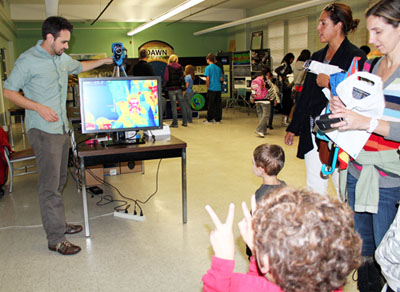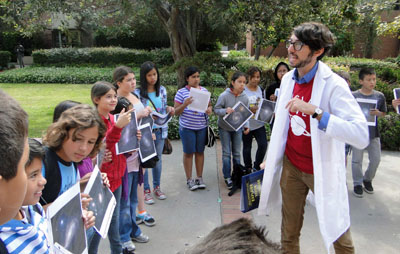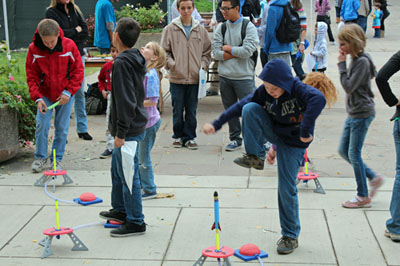Chair's Discretionary Fund

The Physics and Astronomy Chair's Discretionary Fund is an extremely valuable source of funds for our department, permitting flexible, timely, and effective responses to the challenges of maintaining a world-class teaching and research environment. It directly supports many important initiatives that are unique to our department and have a wide-ranging impact on our students, faculty and also on the community. Here are a few examples of the programs supported by this fund. We invite you to be our partner in the success of these and other high-impact programs. The Giving Form is in the menu at right.
Astronomy Live! is UCLA's award-winning astronomy outreach program run by our graduate students. Their focus is on bringing astronomy and all science to the community, especially to underprivileged students. They visit and are visited by local schools, and use hands-on activities about astronomy to teach students and get them excited about learning. Astronomy Live! created and organizes every year the "Exploring Your Universe" multidisciplinary event, which is quickly becoming a tradition for schools and families in the community. This free event is a day of science activities, demonstrations, planetarium shows, and talks geared at kids and adults, with the goal of increasing public interest and enthusiasm for all types of science. EYU has grown dramatically since it first started, and last year involved 10 UCLA departments and student groups for over 1500 visitors. This year EYU will be on Saturday November 10, 2012. You can find out more about it and Astronomy Live! by clicking the link in the menu at right.

UCLA Science Lab Teaching Club: The Physics and Astronomy Science Lab Teaching Club was formed in January 2012 to partially compensate for the loss of science teaching faculty at local public schools due to budget cuts, to provide a teaching experience for undergraduate students majoring in physics and astronomy, and to spark an interest in science in the next generation. The members prepare lessons and practice demonstrations to teach the main physics subjects like electricity, magnetism, waves, optics, etc. Each lesson contains several spectacular demonstrations using laboratory equipment provided by our Department’s demo lab. The goal is to start science education at a very early age, with each lesson being a memorable experience for the children, in order to get them interested in science, technology, engineering and math (STEM) subjects. In Spring 2012, lessons were taught to 4th and 5th graders at a local elementary school. Due to the success of the program, the school requested that the lessons be repeated during the 2012-2013 school year. The Science Lab Teaching Club plans to expand the program to junior high and high schools.

Women in Physics and Astronomy: The Women in Physics and Astronomy group at UCLA is a new program created by graduate students in our department to bring together women from different research fields and at different academic stages (graduate, postdoctoral, and faculty). The aim of the group is to create a network that includes a forum for career advice and mentorship. Activities include talks by invited speakers, public speaking practice, and small social events for informal interaction and departmental community building. In an effort to build a robust mentorship and support program, they host additional visiting speakers from other universities, JPL, LA technology careers firms, the California Science Center, etc. There are also plans to support the creation of Women in Physics groups at other local universities, as well as an open house focused on recruitment.
ETPD Workshop: Over the past two years the Basic Plasma Science Facility (BaPSF) technical team under the direction of Professor Walter Gekelman has converted a large tokamak device into a unique toroidal plasma source, termed ETPD. The plasmas generated in the ETPD are ten times denser and five times hotter than the routine plasmas in the existing LAPD device and will allow the study of frontier problems in plasma physics science. The enhanced research capability provided by ETPD can make the U.S. the unquestioned world leader in basic plasma research over the next decade. Making BaPSF a world-class center for basic plasma science by operating two complementary devices, ETPD, and LAPD, will extend our knowledge of the natural world and train a cutting edge technical workforce. These activities are complemented at the BaPSF by the fact that the UCLA Physics Department undergraduate plasma physics laboratory (with its own state of the art devices) is also located in the STRB. Students acquire a valuable experience with scientists, the BaPSF devices, and researchers working on world-class experiments.
